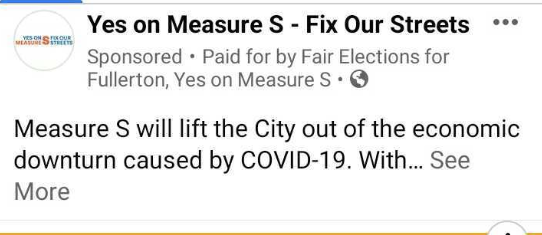The Second Try

Back in 2020 our Lords and Masters at City Hall cooked up a plan to impose a sales tax increase upon people buying stuff in Fullerton. It was staff-driven natch, and lazy liberals Zahra, Quirk-Silva, Flory and Fitzgerald were on board. It was called Measure S. See, they figured the path of least resistance was deploying a new tax rather than finally exercising fiscal restraint.

Measure S soon found itself in the crosshairs of Fullerton anti-tax advocates and some well-placed signs describing the true nature of the beast doomed it to failure come election time.
Well guess what? They’re at it again. This time the idea is something called a Pension Obligation Bond, a mechanism for paying off part of Fullerton’s massive unfunded pension actuarial liability at CalPERS, the State’s giant pension administrator.
An introductory briefing was on the Council’s agenda last Tuesday to start the cheerleading process – a process that will entail the employment of an “expert” who will certainly benefit from a positive result; and of course “bond counsel” the legal camp-followers who push bonds on lazy elected officials after a hot meal and a few glasses of wine.
As everybody knows, the interest on the bonds are ultimately backed up by the collateral of new property taxes. This revenue would go to pay down the pension debt and free up money owed to CalPERS for staff salaries and benefits that will ultimately, and ironically, increase pension debt.
Here’s the second kicker: because a pension obligation bond is not deemed new debt, per se, but a sort of pea-under-the-walnut shell maneuver, no vote of the people is required – as it is in the case of general obligation bonds. It just gets “validated” by a judge and goes through on the nod unless challenged. Ouch. Of course the Council, if it wanted to could put the issue on a ballot anyhow, if they chose to move ahead with this scheme.

Of course the strategy for this type of thing is to reprimand opponents by citing the fact that the daily cost is little more than a Big Mac, or some other trifle and in return we get…what do we get again? Our loyal and devoted “public safety” club will almost certainly gobble up the lion’s share of this taxpayer largesse, just like they already do, and we’ll be even worse off than we already are, and no desperately needed cultural changes will have been made.
I looked over the agenda material on line and found nary a clue as to how this was even agendized. Another smoke screen protecting somebody.
They wear ya down.
That’s one thing you can always count on – the persistency of the bureaucracy to feather its own nest.
I’d like to know how Fullerton was able to buy the property in coyote hills during a time when the city is so close to bankruptcy? Don’t get me wrong, glad their no developing it for housing but WTF!
Did Sharon bring back the bucks from Sacto? There’s always money for stuff she likes.
Like the Illumination Foundation place. Got $4 million for that. About $535,000/year of that goes to rental to the “investor…er, philanthropist” as Paul Leon called him.
Or maybe its her. Or maybe it’s a corporation. We don’t know; we just pay.
Did they bring in another disposable city manager to take the bullet for this?
Yep. Jeff Collier, some retiree they dragged in from Whittier. Nice guy, so they say, but a dedicated bureaucrat, loyal to the tribe with absolutely nothing to gain.
Sorry, nothing to lose. But also nothing to gain by doing it except loyalty to his cohort.
I noticed you didn’t tag Jung does he get a pass?
His record suggests he would never go for this. But if he does he will join the Zahra Quirk club.
I guess I’m the guy that got “dragged in from Whitter” – haha. Anyway, I wanted to share a few thoughts and also offer anyone with questions to come by and meet with me. I appreciate there may not be a full understanding of what a pension obligation bond really is – hence some of the misunderstandings posted. In short a pension obligation bond (POB) is not a new tax nor added cost to the City. The most basic way to explain it is that this is a way to refinance the City’s current pension obligations at a lower interest rate. In short, public agencies, like the City of Fullerton, pay the California Public Employees Retirement System (PERS) at a rate of 7% for pensions costs. A pension obligation bond (POB) allows a city to refinance this current obligation – down to about 3% in today’s market. Just like your home mortgage it is good fiscal stewardship to refinance to a lower interest rate. A POB is the legal way for cities can do just this. In Fullerton’s case this could result in a savings of approximately $3 million each year allowing these funds to be used for other needs – like increasing investment in street maintenance, public safety, etc. POBs aren’t without some risk (as explained in the report to Council) but current market conditions (low rates) make them worth exploring seriously. Again, this is an effort to use good fiscal management to reduce expenditures on pensions so these dollars that are saved by locking in a lower rate can be invested where residents can benefit most. I hope this is helpful as I know I’m only here for a few months but am looking to help Fullerton take wise and prudent steps to strengthen its fiscal condition.
So are you saying the savings by financing at a lower rate is what pays off the interest on the debt? Really?
I’d like to know what happens to these funds once the bond counsel hacks off its piece. The police union will grab up the rest and there you have it. What a waste of time.
Whoa, there Chief.
The bond proceeds are used to dodge the usual restrictions on government investment and hoping for a market return that beats the interest debt on the bonds. How is this prudent or wise? If this goes south the bond holders will be on the hook for both new AND old obligations. Ultimately, as the post points out the taxpayers of Fullerton are the backstop.
Since when does gambling with interest rate constitute wisdom and prudence? Another 2008 and the shit will hit the fan.
2008 is ancient history. That can’t happen again.
I would never hire a financial advisor who’s only going to be here for a few months.
“Just like your home mortgage it is good fiscal stewardship to refinance to a lower interest rate”
Bullshit! My home is a real asset that *I own* and collateral for any debt I take out against it. This asset also has a reasonable probability of increasing in value over time.
Pension debt has none of those characteristics. Please point to the real asset that Fullerton owns that backs pension UAL? You are just trying to trick people with bureaucratic rhetoric. Pension debt is not at all like a home mortgage — stop misrepresenting facts and talking about “good fiscal stewardship”. What you are peddling is not good for Fullertonians — it *only* benefits bureaucrats like you who are receiving an inflated pension AND working as a “consultant” to help other bureaucrats get more for less too.
Exactly. But in the case of POCs YOUR house is ALSO collateral to the extent they can wring property tax increases out of you.
How about using our resources to challenge pensions in court so that we can reduce the benefits to a sustainable level? If you’re not willing to do that, you’re a hypocrite, charlatan, a pig feeding at the trough or all of the above.
Fullerton has no resources to expend fighting union goons and state enablers in court. They have all been squandered.
What a moron you are. Cities don’t “pay a rate of 7% to CalPERS”. CalPERS uses a discount rate to value unfunded actuarial liability. It’s hypothetical — not a real interest rate — and it can change at any time. Jeff, you should not consult in your retirement. You clearly know nothing about finance and you will do the least harm by drawing your fat pension that you didn’t truly earn and not creating a bigger mess than you left for taxpayers when you retired.
A-fucking-men. Why our council hires these $220 an hour zombies to sit there during council meeting is a goddam disgrace.
Because most of the council doesn’t have the intelligence, character or courage to deal with the issues at hand.
A-fucking-men II, The Sequel.
That doesn’t sound like the last 4 or so City Managers (who’s schemes were made behind closed doors with prior council members ). Too bad the last CMs didn’t try this route while interest rates were even lower. At lease Mr. Collier understands the need for public support. That’s a good sign.
Public support for horrible ideas begets horrible outcomes.
What happened to that Stanford professor who advised Fullerton on its pension debt in the past? I’d like to hear what he thinks about pension obligation bonds.
His name is Dr. Joseph Nation and Fullerton bureaucrats won’t want to hear his answer.
“The research I’ve seen indicated that about two-thirds of the time that an agency issues these pension obligation bonds, they actually lose money,” Nation, who is also project director at the Stanford Institute for Economic Policy Research, said. “They come out in worse shape.”
“That, however, doesn’t mean that it’s going to turn out badly,” he said. “But it’s no different than going to Vegas and putting money on the table and saying, ‘I hope this works out.’ But the odds are generally against you.”
Nation said that in his opinion, the biggest problem with issuing such bonds “is that there is this illusion … that you can somehow fix the problem by borrowing more. I mean think about this: ‘Let’s see, we have a ton of debt. How can we fix it? Let’s borrow more.’ Isn’t that a great idea?”
https://www.vcstar.com/story/news/local/communities/simi-valley/2019/07/11/simi-valley-city-council-may-issue-risky-pension-obligation-bonds-calpers-debt/1547016001/
I’d like to hear from anyone who is qualified and disinterested.
I’m not sure I’m either of those but I do happen to know that Placentia did something similar a couple of years ago – but instead of issuing pension obligation bonds they issued lease revenue bonds using the cash to wipe out their unfunded pension debt. They also set up a Section 115 Trust using a portion of their annual pension debt savings to cover any future reductions in PERS discount rate and to also pay down any new unfunded pension debt that accrues moving forward. Placentia’s debt service on their bond is at a fixed rate and won’t potentially change like a pension obligation bond.
My thoughts…Mr. Collier knows what he’s doing. At least he has the balls to put his name on a comment.
What makes you think he knows what he’s doing?
Why does putting your name on something mean you know what you’re talking about?
You have a point. Let me think about it and get back with you.
That was from me,
I believe that is a first!
Peanut, what’s a first?
Jeff Collier, if the City of Fullerton ends up on the losing end of the gamble, will you/your firm guarantee no downside and indemnify Fullerton Taxpayers and make them whole if market conditions go sideways? If not, shut your mouth and leave Fullerton immediately.
There is no free lunch.
Trying to solve a structural debt problem with more debt. It’s no different than those “consolidation loans” banks peddle to people who are on the path to bankruptcy.
Haha. There is no Jeff Collier “firm.” There is a temporary career bureaucrat looking out for his pals.
This only makes sense as an exit strategy from CalPERS.
Buying out now and shifting to 401k style plans may pay out, particularly (but not necessarily) if the bonds are dischargeable through bankruptcy.
Getting out of CalPERS is the only way out of the giant sink hole unions have caused for nearly every municipality in the state.
If I’m not mistaken, the Legislature codified the contracts between CalPERS and public agencies, and now there is not an option to opt-out of the pension system. Therefore, the City of Placentia is one of the last public agency that was eligible to withdraw from CalPERS for their new Life & Safety Department personnel.
And to get out you have to pay a figure that is based on a 3% discount rate which is untenable. CalPERS is hypocritical because while they tout they get higher returns (though they keep lowering their expected return which increased pension UAL), they use a risk free rate (3%) if you want to leave. It’s a scam.
It ain’t getting any better.
Just saying.
Ever notice how every current or retired city manager has the fiscal acumen and “good financial stewardship” of Mike Tyson?
A person picked at random at Home Depot to lead the City would cause less harm and be more beneficial to the City of Fullerton than anyone who has previous or current experience as a “City Manger”. The bureaucrats are all in the business to feather their own nests. They live by the pirates motto: Take all you can! Give nothing back!
Notice how Jeff Collier never came back to comment after multiple folks pointed out the flaws in his logic and the real potential outcome of failure for his policy “solution”? Says a lot about the person, his character and (lack of) courage.
FYI: Resurrection of Florentine’s site with encroachment into public right of way.
https://docs.cityoffullerton.com/weblink/DocView.aspx?dbid=1&id=1499738&page=1&cr=1